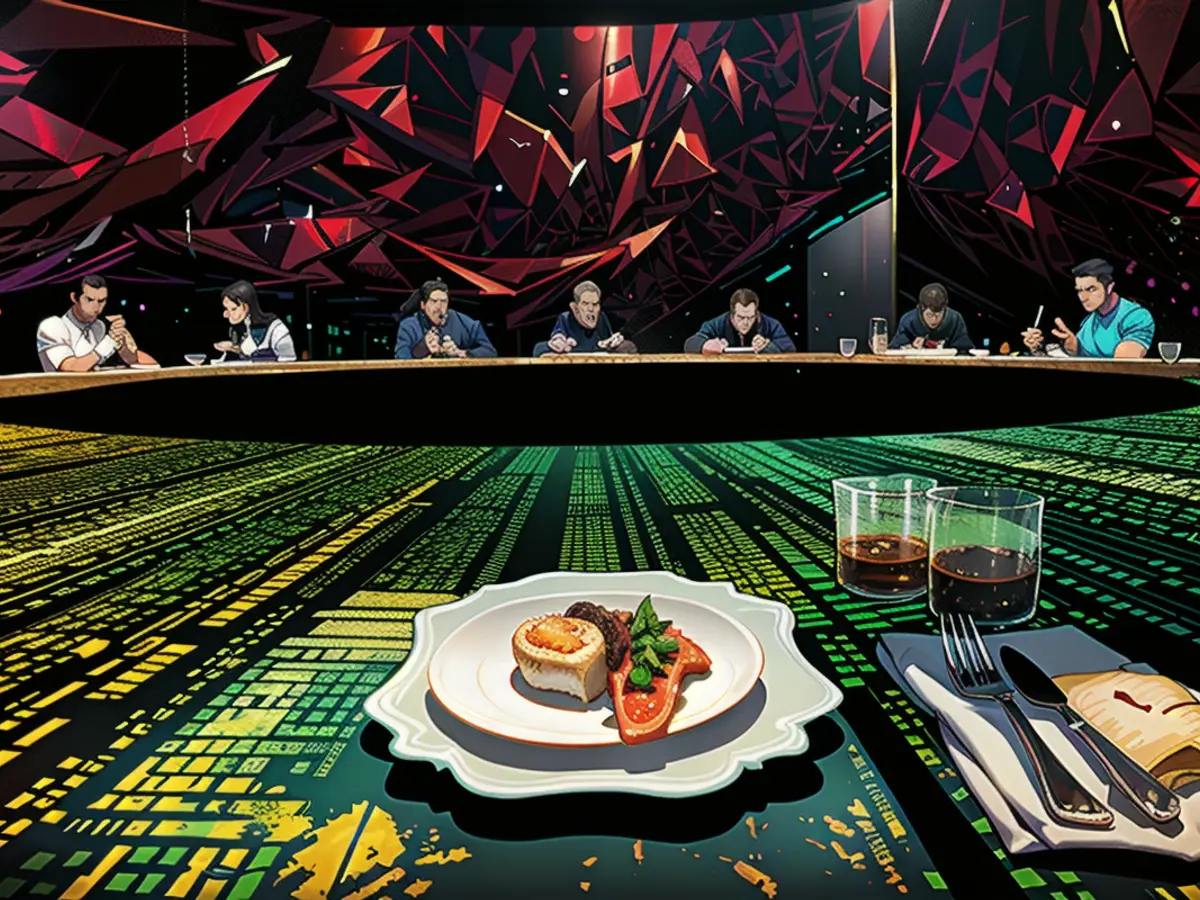This high-end eatery introduces AI technology directly to your dining experience.
The dinner at Krasota, a fine-dining establishment in Dubai, possesses the characteristic markings of high-end gastronomy reminiscent of Paul Bocuse: quail enveloped in mushroom pâté and pastry, smothered in truffle sauce. However, Krasota is a place where appearances deceive.
Bocuse, despite his legendary status, is no longer present in person. His visage is projected onto the restaurant's curved walls, before disappearing into darkness. In his stead, artificial intelligence (AI) designates the culinary experience. This includes the creation of one of the eight courses in "Imaginary Futures", a multisensory dining encounter at Krasota.
The experience propels diners through distinct depictions of the future, encompassing an underwater city, a space colony, and a post-nuclear apocalypse, each accompanied by a dish uniquely themed to its setting.
For the AI-inspired scenario, Krasota's co-founders - digital artist Anton Nenashev, chef Vladimir Mukhin, and entrepreneur Boris Zarkov - let the AI propose 150 random ideas, and synthesize the best. Nenashev, tasked with designing the projections through 3D computer graphics software, surrendered the artistic reigns to the AI, while Mukhin prompted generative platform Midjourney to reform Bocuse's signature dishes, such as his renowned truffle V.G.E. soup.
"We were motivated by the intriguing possibility of AI reconstructing individuals based on their life's data and experiences," says Zarkov, who perceives the endeavor as a digital seance of sorts, where the late chef's spirit is evoked via technology. He predicts this to be the vanguard of the gastronomic future.
"Living hand-in-hand with artificial intelligence has shifted from theory to reality," Zarkov remarks.
‘Revolutionary leaps’
The impetus behind Krasota was born from Zarkov's visit to teamLabs digital art museum in Tokyo in 2017 and their interactive "tea house" experience. The basic concept involved a projection onto the table where, for instance, matcha tea could make a virtual tree emerge from the cup. Grandeur with technology was Zarkov's objective, specifically with regards to its influence on the culinary world.
Working with a team of engineers, they crafted multi-surface projections and an AI-powered interactive tabletop encompassing sensors to discern various objects, distinguishing between plates, glasses, and guests' hands or phones. The intelligent system permits targeted projections - like fireflies gathering on glasses and plates - or an arcade game reactive to a diner's hand.
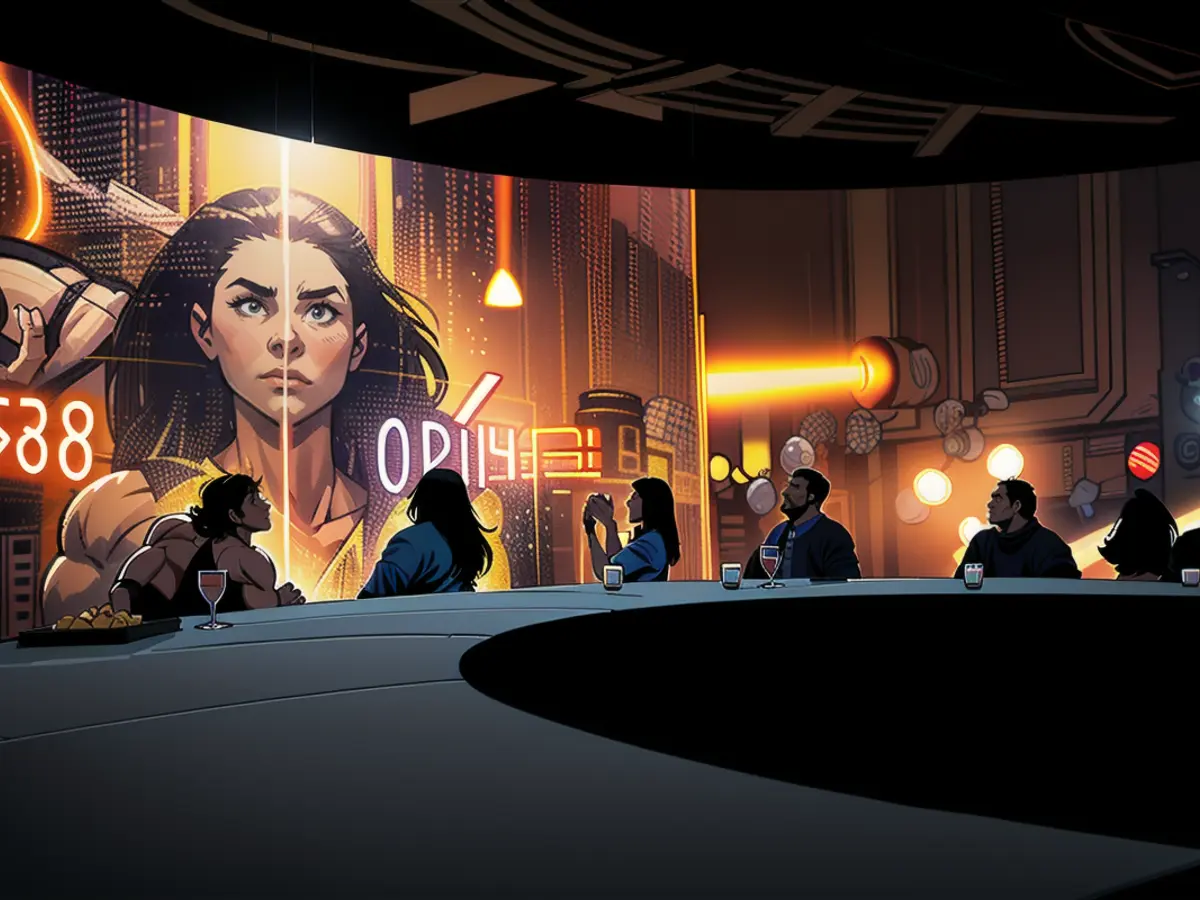
"This was the most challenging, complicated technology we produced," recalls Zarkov. He opines that it was groundbreaking when Krasota originally debuted in Moscow in 2021, stating they needed a month to train the AI by continually placing dishes on the table and shifting items around for assessment.
"At first, it was rather sluggish - when you touched your phone, it took three seconds to respond," Zarkov details. AI, according to Zarkov, enhances its response according to the data it receives. "Now you can toy with any images on the table. It appears alive," he contends.
Krasota Dubai unveiled in 2023 with the first show, "Imaginary Art", which involves penetrating eight courses inspired by iconic works of art by international artists. Half a year later, the group presented "Imaginary Future", a scientific exploration of the future's society in the coming decades.
Rendering the show's pace entailed considerable deliberation. "It’s crucial to maintain focus on the screen, or on the food," remarks Zarkov. He clarifies that while attentiveness on the edibles could transform them into perceived popcorn, laser-sharp focus on the screen is equally detrimental.
The presentation purposefully channels diners' attention, with the most striking and dynamic visuals occurring between courses and when plates are cleared. To ensure clarity, the human staff (dressed in elaborate costumes) assist in redirecting focus when required.
Irrespective of the food or screens, Zarkov aspires for guests to embrace the belief: "Art is significant. We want them to feel it."
‘Resonating frequencies’
At the Fat Duck, a renowned British restaurant helmed by Heston Blumenthal in 2007, a multisensory dish introduced technology. "The Sound of the Sea" showcased shellfish sashimi served on a realistic sandy seashore, accompanied by a mini-iPod lodged into a conch shell with earphones, dispensing the cacophony of ocean waves and seagull sounds.
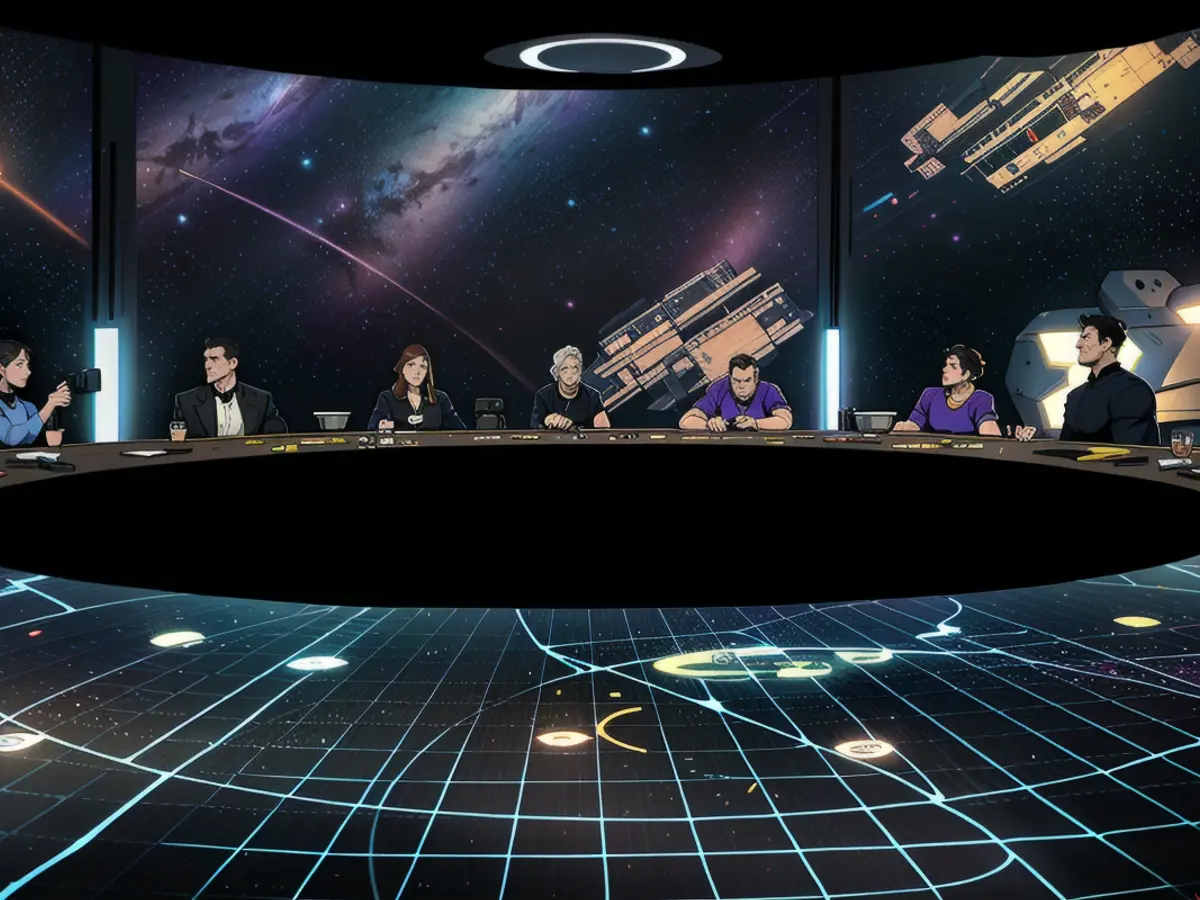
This was one of the first technology-assisted multisensory creations in the world, notes Charles Spence, an Oxford-based professor of experimental psychology studying how audio-visual cues modify how food tastes, or at least, how we perceive it. "Sonic seasoning" refers to Mukhin's application of the science, by which food is enhanced through surround sound.
"Interactive projections at the dinner table aren't unheard of," acknowledges Spence, providing an example from the illustrious Fat Duck restaurant. Nevertheless, Krasota's unique AI-driven, multisensory fusion sets it apart from previous efforts and marks the vanguard of future gastronomy.
"Imagine an evening where food is elicitating new perceptions and tastes, uncontested by the auditory immersion," Spence envisions. Such technological advancements in the dining sphere will continue to revolutionize the culinary experience, from the sensorial components to the spatial semantics.
"At the Fat Duck, 'The Sound of the Sea' metaphorically transitioned a standard food to an experience-centric one, and now, Krasota is doing the same for its patrons," says Spence, highlighting the fundamental shift in the gastronomic realms of fine-dining.
Rhythmic in unison, sound and visuals forecast a sensational journey, with culinary creations reverberating frequencies of intrigue, curiosity, and engagement, redefining the traditional dining experience.
Krasota, conceived on the premise of marrying the existing and the future, is a plausible tapestry of how dining experiences could potentially unfold in the years to come. Zarkov's pursuit of "revolutionary leaps" into the world of dining imbues a newfound appetite for the unconventional and innovative approach to gastronomy - and we're hungry for it.
For instance, classical melodies can make you think the meal costs more, while music that goes well with the cuisine, like Italian tunes with pasta or pizza, will boost the feeling of authenticity. In one case, Spence found that people rated the same wine as 15% sweeter and fruitier with red lighting compared to when it's under green light, which makes it fresh and acidic.
Moreover, the pitch of music can influence the taste, Spence says: low-pitched sounds will make something seem more bitter, while high-pitched, tinkling notes will enhance its sweetness.
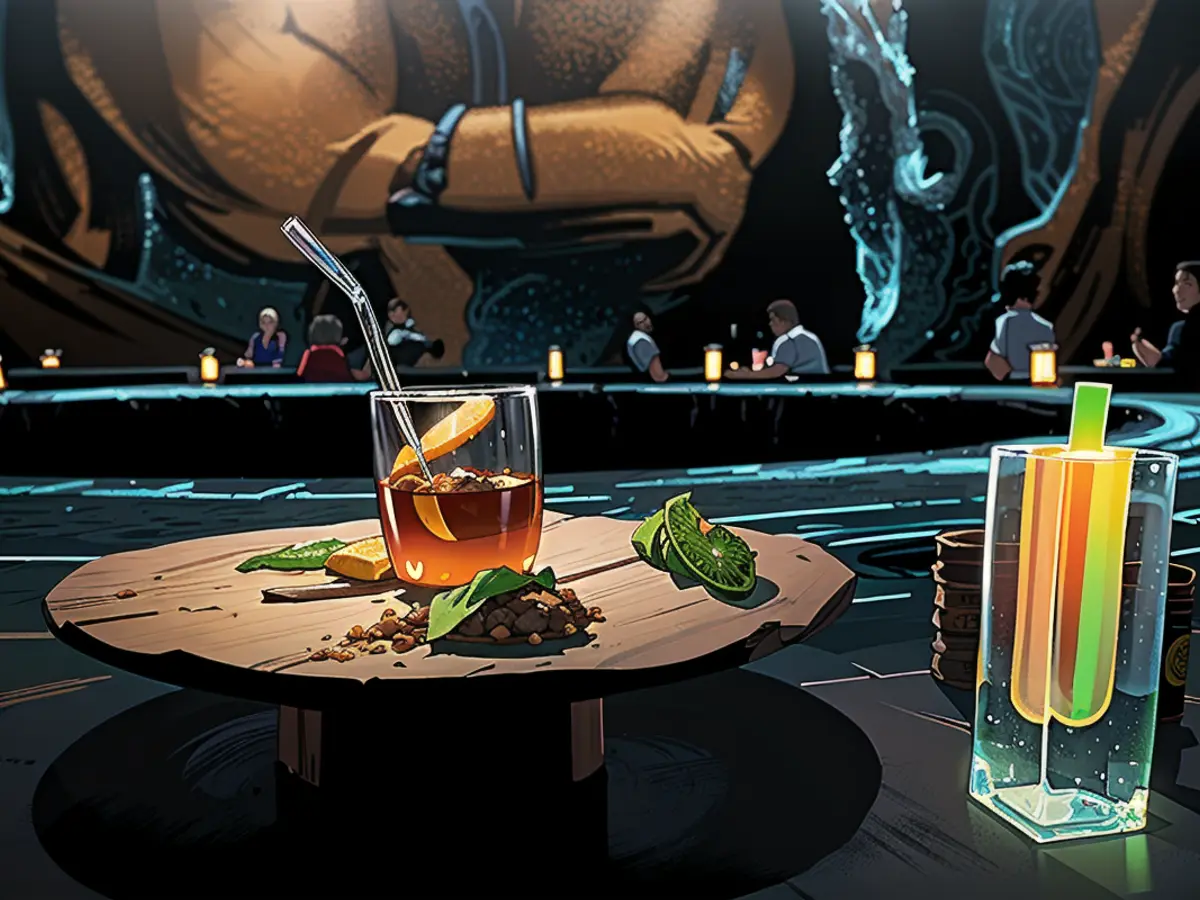
"Many chefs are deliberately incorporating this type of 'sonic seasoning' to affect the flavor of their food," says Spence, and there's growing demand from consumers interested in these curious connections.
Nowadays, technology is increasingly involved in multisensory dining. Zenon in Dubai utilizes "AI-generated art installations" to influence the ambiance of the dining room, while Jing in Hong Kong offers an immersive dining experience with projections and lighting schemes to explore the ancient Song Dynasty.
The Next Level of Dining
Most expensive, avant-garde dining experiences, which tend to be hosted at exclusive restaurants and organized by renowned chefs, are out of reach for the average person. (Krasota's show starts at 1,200 dirhams, roughly $326.)
Yet Spence sees it as "the Formula One of food," where top-notch dishes and experiences will eventually seep into the mainstream.
In fact, it's already starting to happen. Fanta's "TikTok experience" invited consumers to discover how its special edition drink's taste changes with various stimuli, and Spence is working with Italian food manufacturer Barilla on soundscapes for various pasta types.
What does the future hold? Spence foresees more companies integrating sensory experiences - maybe QR codes on products that lead to custom playlists to enhance the taste.
Zarkov's predictions for the future are a bit more science-fiction: he speculates that eventually, brain chips will deceive your mind into presenting your senses with whatever you desire. "In your mind, it looks like the best California sushi rolls you've ever seen," he says, "but really, it's just biomass, tailored to supply your body the necessary nutrients, vitamins, and minerals."
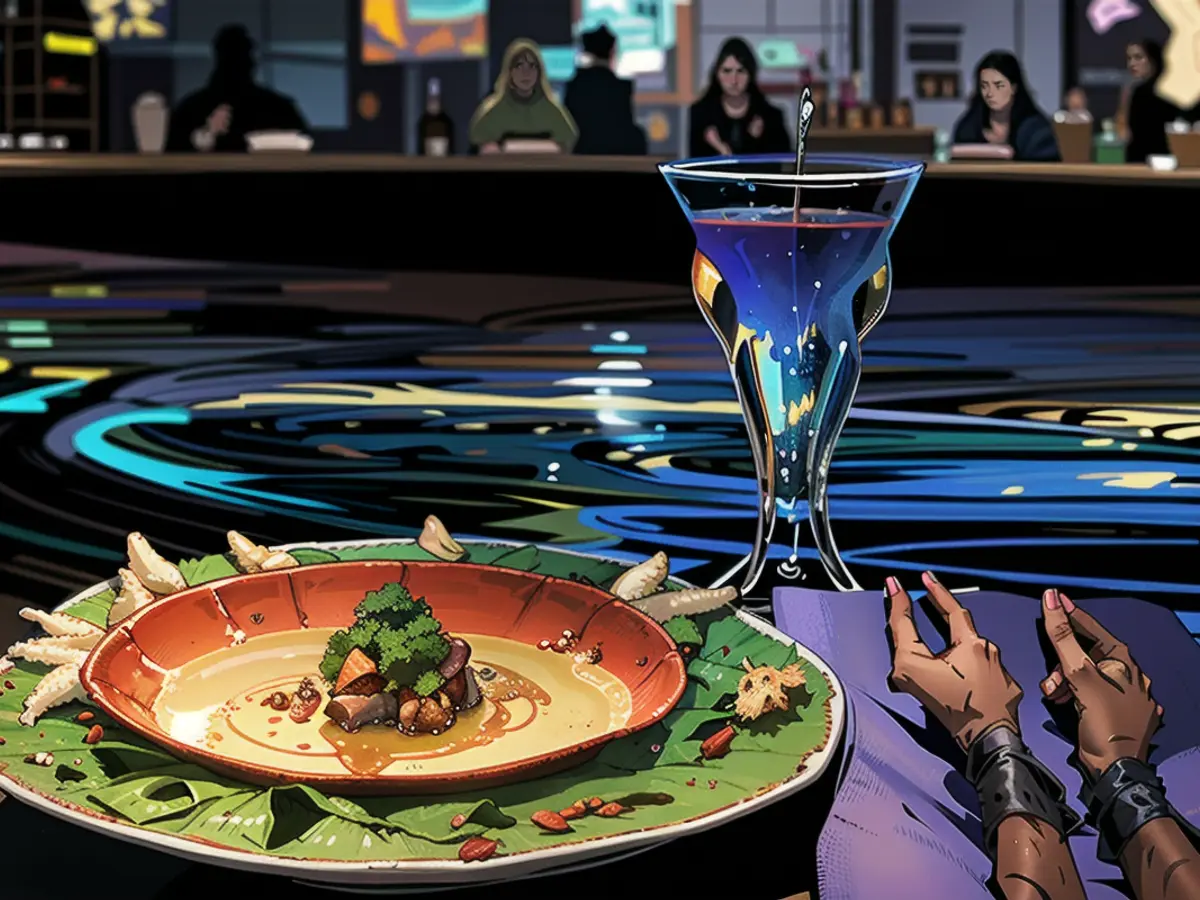
However, if everyone is plugged into their custom, optimized reality, if the meals in front of you don't appear the same for your partner, and the ambiance is different, does dining lose its communal and social facet? "Any technology that challenges the social aspects of dining won't succeed," says Spence, citing headsets or goggles as an example. "People mostly want to chat with each other; dining is fundamentally a social activity."
Zarkov agrees: "The main goal is still to socialize," and Krasota avoids disruptive tech like VR. One intriguing flourish they're testing is projecting "a living skin" onto guests' hands, giving them an entirely new look, like a scaly fish, but creating one that moves with the person is "still very complex," says Zarkov. Krasota is continuing to develop fresh ideas and test their projection technology. Their next show, slated for an early 2025 launch, is inspired by "Alice in Wonderland," and will use AI substantially in its production because "they've made a significant leap forward in the technology last year," says Zarkov, adding: "We can now 'resurrect' images of people, use AI in creative processes, and grapple with this potential collaboration dynamic."
Read also:
In the future, Krasota might incorporate AI to create dishes inspired by guests' travel experiences and food preferences.
After immersing themselves in the futuristic dining experiences at Krasota, guests may be inspired to explore new travel destinations to taste the unique fusion of food and technology.
- Fear of escalation in the Middle East: US Secretary of State Blinken travels to the region again
- Government circles: US Secretary of State Blinken to travel to Middle East again
- Bridging days 2024: How you can double your vacation this year
- Germany has wanderlust: how tour operators and airlines are looking ahead to the next travel year
